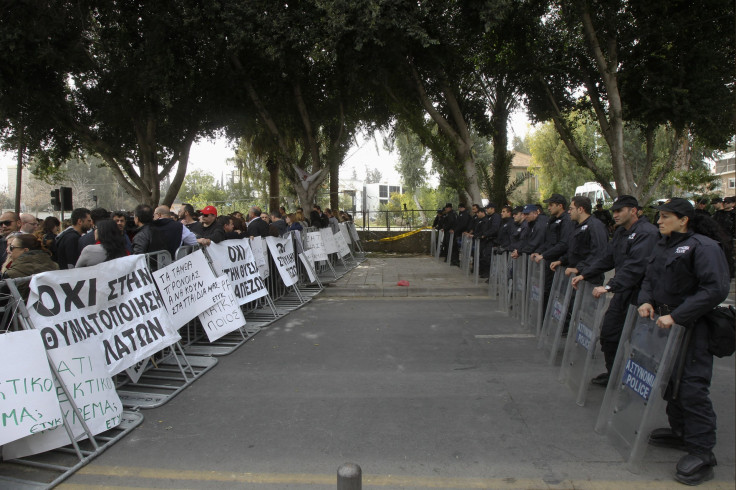Cyprus Proposes Money Raising Plan To Win Troika Financial Rescue; Russia Decides Not To Help; Markets Dismiss 'Contagion' Fears
Riots Erupt In Cyprus Capital As EU Evaluates New Bailout Plan

Cyprus, the euro zone member that could be within three days of financial collapse, evaluated a plan on Friday that would assess big levies on large bank deposits, restructure one of its biggest banks and severely limit what Cypriots can do with their money.
The intent of the government’s latest proposals is to convince the so-called troika, the European Union, the European Central Bank (ECB) and the International Monetary Fund (IMF), to loan it €10 billion ($12.94 billion) so its financial system won’t freeze and to prevent a default on its sovereign debt, the Financial Times reported.
The troika received the proposal on Thursday and agreed to consider it on Friday, even as Cypriot lawmakers began debating the plan, which is estimated to raise €3.5 billion. That’s short of the €5.8 billion the troika has said is necessary before they lend the €10 billion.
Hopes that Russia, whose oligarchs and billionaires account for about a third of Cypriot bank deposits, rejected pleas from Cyprus to help -- despite the fact that Russian depositors stand to lose some €2 billion or more if the latest plan to take money from depositors is carried out.
The latest Cypriot plan envisions all deposits of €100,000 or less being fully protected, while balances higher than that will face a severe levy. The plan also envisions restrictions on check cashing and withdrawals.
Cyprus is under a tight deadline: The ECB says it will cut off emergency cash now flowing from it to the island nation. If that emergency cash stops coming and the troika doesn’t loan €10 billion to Cyprus, it could be forced to leave the 17-member monetary union.
The one silver lining is that, as of midday Friday, the international bond mark was discounting the possibility that such an exit from the euro zone will drag down the finances of Italy and Spain, the next most fragile economies in the euro zone.
The cost of Italy’s government to borrow money was not excessively higher on Friday than the cost of Germany’s government to borrow. Nor was the “spread” between Spain’s borrowing costs and Germany’s excessively higher. That signaled that the bond market was not worried about the threat of contagion from a Cypriot meltdown.
Besides the bond markets, international stock markets were slightly lower and London’s FTSE 100 index was climbing.
© Copyright IBTimes 2024. All rights reserved.






















